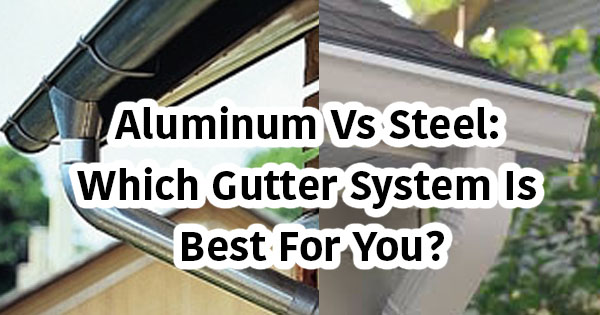Aluminum vs. Steel: Which Gutter System Is Best For You?
 Modern rain gutters were invented as late as the 20th century, but their uses to diverge water away from the home are as old as the Roman Empire. Roof gutters are available in a wide range of materials including copper gutters, vinyl gutters, and zinc.
Modern rain gutters were invented as late as the 20th century, but their uses to diverge water away from the home are as old as the Roman Empire. Roof gutters are available in a wide range of materials including copper gutters, vinyl gutters, and zinc.
Two of the most popular types of residential gutter systems are steel and aluminum gutters. These types of residential gutter systems have been around the 19th century and continue to be some of the most favored materials of modern residences to this day. However, because aluminum and steel gutters are fairly similar, how can you choose between them?
Aluminum gutter systems
Aluminum is a lightweight, durable, and rust-free material, which makes it the most popular of residential gutter systems. The thickest of these gutter systems can withstand falling tree branches, ice, and damage from snow.
The vast majority of aluminum gutters are painted brown or white in order to match homes of both light and dark colors. However, they can be painted any color you like to blend in or stand out as much as possible.
Additionally, aluminum rain gutters can be installed onto a roof via hidden brackets, exterior brackets, strap hangers, or screws. However, it should be noted that aluminum is known to contract and expand with the outside temperature. By installing your gutters with expansion joints, you can also keep your gutters from wrinkling during temperature changes.
Steel gutter systems
Steel gutter systems are the strongest type of roofing gutters. Like aluminum gutters, steel gutters can be painted any color a homeowner desires although they most often appear white or brown to blend in with the home’s existing color.
As the strongest of gutter systems, steel gutters can withstand damage from a variety of weather and wind-strewn debris including falling branches, ice, snow, hail, and leaning ladders.
Like aluminum gutters, steel gutters are often held to the roof by exterior brackets, hidden brackets, or strap hangers. And, although steel expands less than aluminum, expansion joints may also be necessary for gutter installation.
While aluminum gutters may cause problems because of their expansion and constriction during temperature changes, steel gutters may cause problems with rust. Steel gutters are not rustproof like many other gutter systems. Therefore, while they may be able to withstand strong weather conditions, a gutter replacement may be necessary after five to 10 years.
Aluminum and steel gutters are remarkably similar in their appearance and popularity. However, both have their own set of unique characteristics that make them favorable to various homeowners. Whether steel or aluminum gutters are right for your home depends on your climate, your style, and your personal preference. Both make for a great residential gutter system.
